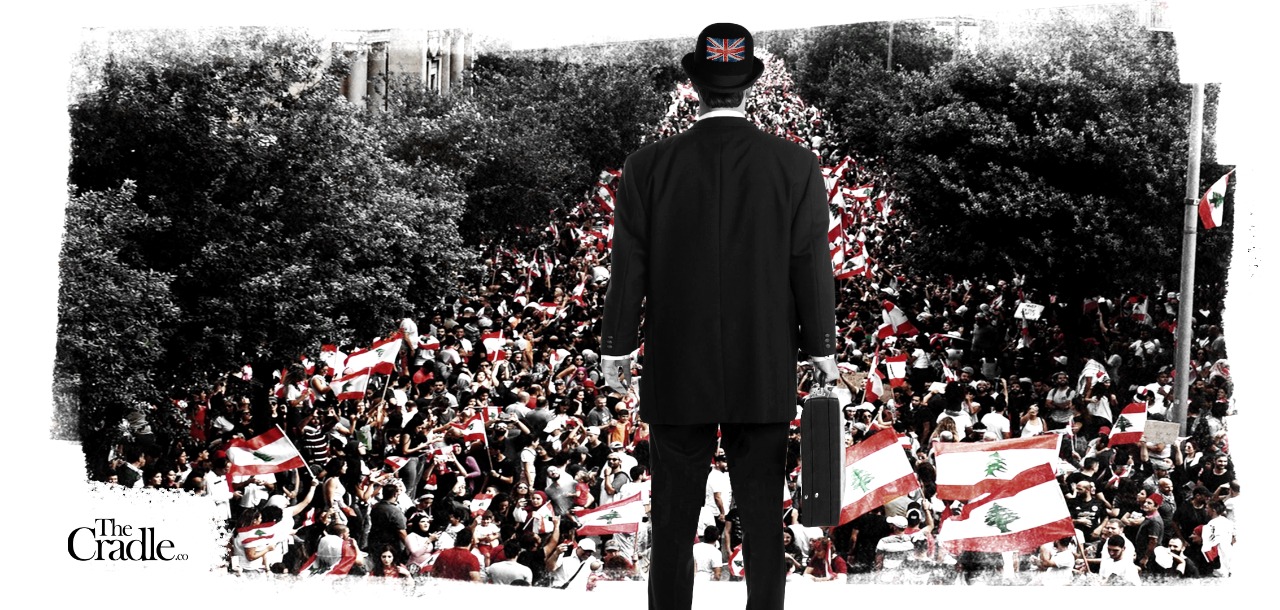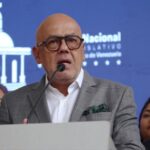
By Kit Klarenberg – Aug 20, 2021
Leaks show UK Foreign Office directed influence operations targeting Lebanese youth and civil society to shape the direction of mass protests in service of British interests.
Editor’s note: The leaked British Foreign Office documents described in this investigation first surfaced in December 2020 and were covered in local Arabic-language media, but largely ignored by their English-language peers. As Lebanon’s economic and political condition worsens, with Western states taking the lead in exacerbating the crisis, The Cradle has decided to revive these leaks to shine a light on how the British government uses stealth and manipulation to sway Lebanon’s political outcomes.
On 15 July, Lebanese Prime Minister-designate Saad Hariri resigned for the second time, having failed to form a government after nine months of unsuccessful negotiations. It was just the latest cataclysmic chapter in the political turmoil that has gripped Lebanon for years.
Hariri first resigned in October 2019 after large-scale, incendiary protests engulfed Beirut, saying he wished to create a “positive shock” to the system. But the streets of Lebanon continue to ebb and flow with protestors, motivated by grievances over waste management, corruption, unemployment, falling living standards, rising inflation and a myriad other failings of the government.
While few would argue their collective complaints are without merit, there are unambiguous indications this tumult was covertly fomented by hostile foreign powers, including the United Kingdom, in service of regime change.
Contentious politics
Leaked Foreign Office files in December 2020 reveal that seven months before the protests erupted, the UK commissioned a Target Audience Analysis in Lebanon, which sought to pinpoint a segment of the population that could effectively be mobilized to “affect positive social change,” and provide methods of reducing tensions between sectarian communities to unify them in opposition to the country’s ruling elite.
The Target Audience Analysis was delivered by ARK, a shadowy consultancy founded by probable MI6 operative Alistair Harris, which has managed “destabilizing psyops” (psychological operations) on behalf of both the US and UK governments the world over. It identified a potentially ideal target audience, amounting to 12% of the Lebanese population, whose disavowed violence did not reject “other forms of contentious politics,” and could be “influenced” to engage in “behaviors leading to positive social change,” such as protests and civil society initiatives.
In order to stir this audience to action, and develop it to “include a larger fraction of the public,” ARK proposed a clandestine, multi-channel assault on public perceptions by way of a wide-ranging strategic communications campaign. A Whitehall tender document for the project shows it cost £2,100,000, and ran from April 2019 to March 2021.
ARK’s submissions to the Foreign Office make it clear that it has been running manipulative ‘programming’ in Lebanon since 2010. Cited examples include a British Embassy in Beirut-funded multimedia electoral communications campaign in 2017/18—dubbed Get Out The Vote—“to motivate first-time voters to engage with the democratic process.”
Working with four local partner organizations, the company created and disseminated “compelling” content via social media, local broadcast channels, print media, and billboards around the country. The activities of its successor the following year, dubbed Take Action, including mock elections in universities, flash mobs, and rock concerts, were said to have been “covered by local journalists and influencers” and “regularly trended on social media” as a result.
In subsequent public surveys, ARK bragged that Take Action billboards were the second most-recognized among respondents, “significantly ahead of political entities and beer company advertising,” with 30 percent of first-time voters having engaged with the campaign in some way or other.
The company’s activities in Lebanon are so extensive that it has a dedicated production hub in the country, supported by another in London, producing output for websites, TV, and a 30-strong constellation of “targeted” social media assets in West Asia, publishing original content five times per day on average, with just one reaching 45 percent of Lebanon’s population.
Particular attention was drawn to Facebook page Ana Hon (“I am here” in Arabic), which was secretly created by the company under the auspices of a youth empowerment project funded by the Canadian government to build “the communications and mobilization capacities of young people” in Tripoli, Sidon, and Central Bekaa, and “identify and promote positive stories from their communities and peer group.”
Locals were trained on video production to “develop compelling social media coverage of these activities,” and shared in order to encourage other young Lebanese to “participate in or replicate” similar pursuits. The endeavour bore significant fruit. By September 2018, Ana Hon’s reach stood at a staggering 16.3 million people and one million views per month, including an estimated 37% of Tripoli’s population, with three-quarters of page followers aged 18–35.
RELATED CONTENT: 38 British Watchtowers Span Lebanon’s Borders: Who are they Really Watching?
Recruiting ‘Agents of Change’
Expanding Ana Hon’s reach was central to ARK’s strategic communications plan. Regional hubs were to be established in Beirut and other locales, publishing stories on initiatives that provided “replicable examples of pro-social behavior,” and the primary page serving as an aggregator. This “hyper-local” approach would ensure delivery of messaging to a wide variety of audiences, ensuring citizens of all ages, religions, and classes could be propagandized and arrayed against the rulers of Lebanon.
This was to be achieved by recruiting and training a legion of new Ana Hon reporters—at least 50% of whom would be women, “as they are more likely to be able to conduct effective outreach to female audiences”—on top of the platform’s existing 24 staffers. Offline events were to “reinforce messaging and support sustainable behavioural change” [emphasis added].
ARK also sought to create a “network of social stability champions” comprising “established local media actors and influencers” who “share the UK’s objectives,” provide them with “tailored training” in production and messaging, while “recruiting agents of change”—local governance actors and NGOs. In tandem, the company’s cut-outs would engage in cooperative endeavors, for broadcast via Ana Hon, and promotion in the national media, to “maximise their impact” and boost their “name recognition and credibility.”
A file related to risk management indicates ARK was well aware of the dangers inherent in its cloak-and-dagger activities, with the firm noting that Hezbollah supporters had responded to Whitehall’s March 2019 designation of the movement’s political wing as a terrorist group by “threatening attacks” on UK government “interests” and “affiliated groups” in Lebanon.
Still, the company assured the Foreign Office it would be able to forewarn the department of any resultant “direct threats” to the project as it “regularly” monitored Hezbollah-affiliated social media channels, including private WhatsApp messenger groups, for potential hazards, and would furthermore “adapt programming,” if and when necessary to mitigate. The question of how ARK gained illicit access to those groups is an open one.
Whatever the truth of the matter, the firm reinforced the fact that its local partners—media outlets, “governance actors,” and NGOs—would be the public fronts of the initiative, in essence, buffers ensuring the UK’s role was obscured from view.
“Content will not be directly attributed to the UK [and] this project will be designed and presented [emphasis added] as a social cohesion project, providing a strong defence against any attacks on the UK,” ARK pledged. “Partners will be selected for sharing project objectives [and] based on their credibility as messengers and/or existing, established follower bases inside Lebanon. All content will be hyper-local, referencing local themes, locations and individuals that the target audience understands.”
Countering disaffection
A separate Foreign Office operation in Lebanon reveals the country’s youth are also “Agents of Change” that ARK seeks to embroil in its regime change efforts. Set to run from July 2019 to March 2021 and costing £1.2 million, it aimed to stimulate “fresh national thinking and debate” in young citizens “to challenge restricted political, social, and economic choices,” and in turn compel “greater communication and engagement with municipal governance and parliamentary structures and processes.”
“Youth engaged in the project should be equipped with the necessary political, civic, and core skills including dialogue, communications, problem solving, and monitoring, to contribute to change,” the tender stated.
Key targets listed in the document included university students, youth groups, social movements, members of parliament, and political parties. Due to its past electioneering drives, ARK was well-placed to access these elements and members thereof.
It boasted in submissions to Whitehall that it enjoyed “strong” relationships with, among others, the Lebanese Association for Democratic Elections—with which it was “partnering on [a] US-funded governance accountability project”—the Professional Centre of Mediation, Louder, youth organizations Beirut24 and Hala Baqa, and “female governance actors,” such as Beirut MP Rola Tabish. These associations were said to have been “essential” to the Take Action campaign.
Another document mapped out a “theory of change” for the operation, which contended that if ARK successfully fostered a culture of active youth participation in political life that transcended “confessional lines,” enabling young people to become more involved in decision-making processes and “able to hold political institutions and individuals accountable,” then governance in Lebanon would by definition be “improved”—presumably a euphemism for “more pro-Western.”
To achieve this, ARK proposed hosting political participation boot camps across Lebanon, in which attendees engaged in a range of tasks and activities. The company helped them identify “critical local level issues that should be addressed by governance actors” and explore different strategies by which they could be raised and resolved. The company would also convene monthly town hall meetings and other “engagement forums”—such as “municipal youth committees”—between young people, political activists, party leaders, and government officials.
Youth groups would, moreover, be assisted in carrying out surveys of local communities to identify key issues of concern to be raised at the meetings. For the first year of the project, these summits would be facilitated in-house; thereafter, responsibility for organizing them was to be transferred to youth collectives. ARK projected that some of these outfits would be of its own creation. For example, it recommended the creation of a network of young women engaged in politics across Lebanon and connecting them with a mentor in order to form “a national group capable of pushing for greater change.”
Training resources and educational material from the project would be published online, on social media, and in a series of youth-focused websites developed by ARK, along with political interviews, question-and-answer sessions, coverage of bootcamp events, “calls to action,” and “humorous messaging campaigns” developed with local firm 4-Production. Activity on these assets would ramp up ahead of the 2022 elections to boost youth turnout.
ARK selected Beirut, Bekaa, Chouf, and Tripoli as priority regions for intervention, as its Target Audience Analysis indicated young people in these areas were “most likely to be effectively influenced to engage in political behaviours leading to positive social change,” and the company’s previous campaigns meant it had a reputation as a “credible actor” among local youth groups there.
For instance, during its Take Action campaign in Bekaa—an area of mixed sectarian backgrounds—ARK organized a boot camp for 30 students at the Lebanese International University and convened town hall meetings between them and MP Abdul Rahim Murad.
Meanwhile, Chouf was considered an urgency, as increasing youth activism following the 2016 municipal elections ended in “disappointment” two years later, when the opposition list fell short of the threshold for a parliamentary seat. Involvement there was projected to “help counter youth disaffection and leverage high electoral participation towards sustained positive engagement.” The details of conspiracies to meddle in foreign elections are rarely spelled out so bluntly.
Perhaps unsurprisingly, the need for total secrecy was again paramount, with ARK stressing the project would not be in any way connected to the UK, but instead “presented to the public [emphasis added] as a Lebanese-led youth political engagement project.” By way of reassurance, it drew attention to previous experience successfully implementing “low-visibility” projects in the country without the UK’s hidden hand being revealed at any stage.
RELATED CONTENT: Resistance is Not Futile: A Brief History of Lebanon’s Hezbollah
Unified in outrage
Unluckily for the Foreign Office, the reality of ARK’s machinations in Lebanon was exposed very candidly when these and many other highly incriminating files were leaked on the internet in December 2020. Within 10 days, Alistair Harris had fled the country for London to take up a post within Whitehall’s Civilian Stabilisation Unit.
The extent to which the operations outlined in this article may have influenced anti-government protesters in October 2019 and after is unquantifiable. However, Western media coverage of the unrest—old and new—takes on a distinctly chilling quality in light of their content. Take, for instance, an Open Democracy article, published weeks after the upheaval began, which documented the frontline role of women in the “revolution.”
Among other things, it recorded how days earlier, feminist groups had marched to Beirut’s historic Riyad el Solh Square, armed with banners bearing radical slogans relating to gender equality, social justice, and women’s rights. “If there were no women, I don’t think the revolution would have happened,” one activist quoted in the piece said.
Had any of these collectives, or their members, been tutored in “pushing for greater change,” holding “institutions and individuals accountable,” and challenging “restricted political, social, and economic choices” by ARK in some way or other? Did they, wittingly or otherwise, form part of the UK’s covert “network of social stability champions” in the country?
Similarly, a contemporary Reuters report—Young, angry Lebanese ditch their differences to target ‘unjust’ system—records how youths of different sectarian extractions had banded together over the course of the protests, as they were “unified” in their “outrage,” is eerily resonant. It was surely not for nothing that ARK specifically sought to foster a culture of active youth participation in Lebanon across “confessional lines” and specifically ran political training “boot camps” in the multi-faith region of Bekaa.
Today, Lebanon teeters on the brink of economic implosion, which the World Bank predicts could rank among the worst ever witnessed over the past 150 years. Despite the worsening crisis though, the coast is now again clear for ARK. In late June, Alistair Harris proudly tweeted a photo of himself assembling personal protective equipment alongside the inhabitants of Beirut’s Shatila refugee camp.
The return of Harris is unsurprising. After all, ARK’s website states the company “[delivers] programming that meets short-term stabilisation objectives… [laying] the groundwork for long-term development, growth and stability.”
And so the groundwork for an “improved” Lebanon—as envisioned by a covert psyops enforcer—was being laid out again. Once that is comprehensively achieved, the closer the country edges to collapse, the more likely a “better” Lebanon would emerge—one that befits the financial, ideological, military, and political interests of Western nations.
Featured image: British government funded psyops organizations are fomenting crisis in Lebanon through an extensive propaganda network. Photo courtesy of The Cradle.
- scorinocohttps://orinocotribune.com/author/sahelicot92/April 14, 2024
- scorinocohttps://orinocotribune.com/author/sahelicot92/
- scorinocohttps://orinocotribune.com/author/sahelicot92/
- scorinocohttps://orinocotribune.com/author/sahelicot92/
Tags: ARK Beirut Hezbollah Imperialism Lebanon Lebanon economic crisis psyops regime change UK foreign office
Share this:
- Click to share on Twitter (Opens in new window)
- Click to share on Facebook (Opens in new window)
- Click to share on LinkedIn (Opens in new window)
- Click to share on WhatsApp (Opens in new window)
- Click to share on Reddit (Opens in new window)
- Click to share on Telegram (Opens in new window)
- Click to email a link to a friend (Opens in new window)





